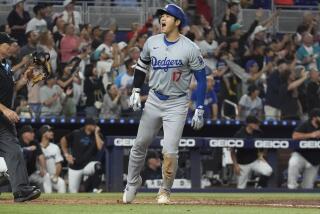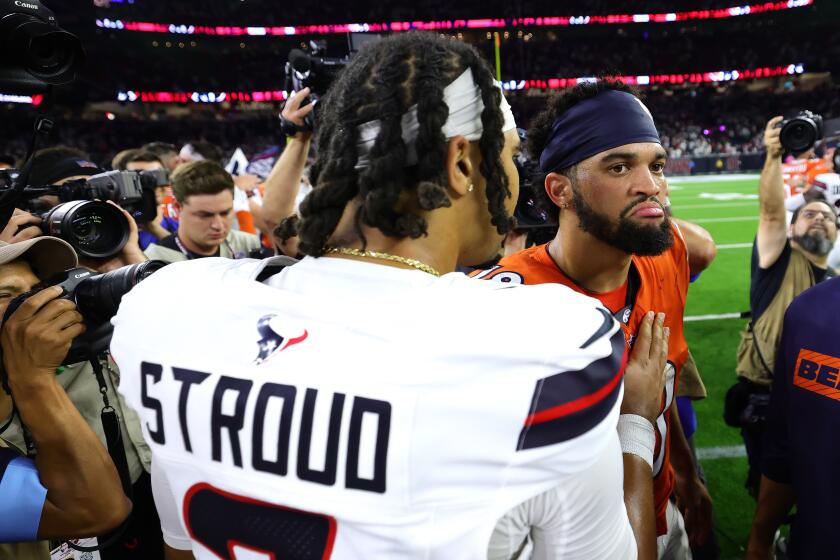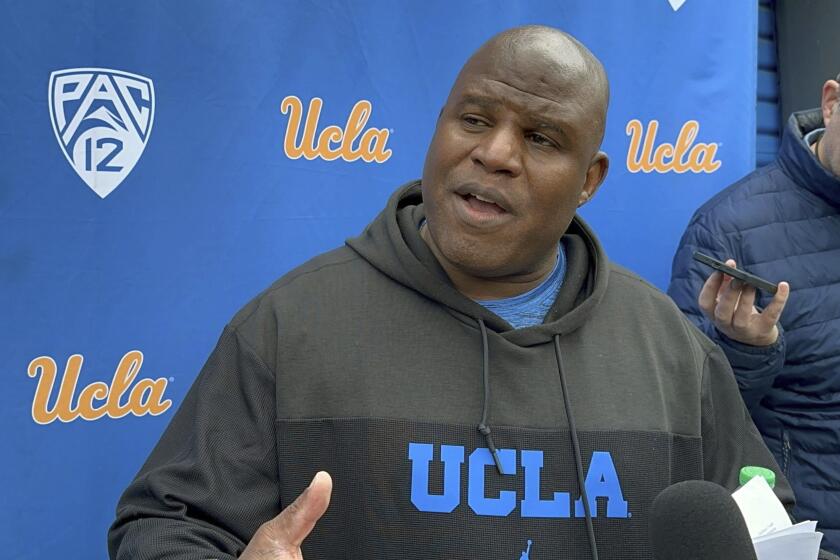Where a Day At Park Is Sunny Experience : Baseball Traditions Are Short in Southland; That Includes Fan Violence
In the late 1950s baseball was brought to Southern California. And with a typical display of good manners, the favor has been returned. Southern California has been brought to the sport of baseball.
In every stadium there is a distinct flavor that stems from the climate, the standard of living and the values characteristic of the particular region.
Like so many other elements of Southern California, baseball seems to be a little more pleasant here than it does most anywhere else.
At Wrigley Field, the Cubs lose and their fans die, and they make heated pleas to perpetuate their daytime mystique so that the game can be viewed in the same light as always.
At Dodger Stadium, they fling Frisbees in the parking lot and complain only if the sun isn’t shining quite as intensely as they would prefer.
In New York, hot dogs, pretzels and peanuts are the regular fare, just as they were a half century ago.
In Anaheim, shrimp cocktails at $6.25 a shot are served by meticulously neat vendors and strawberry daiquiris quench the thirsts of Angel fans.
On the East Coast and in the Midwest, brawling in the stands has become nearly commonplace, accepted almost as much as a pop fly or a double play.
In Southern California, fans battle each other for the right to poke at a beach ball. It generally doesn’t get more raucous than an unrestrained Wave. They munch on nachos, work on their tans and cheer when they’re supposed to cheer. For many, baseball is merely a diversion, no different from a trip to the beach or a backyard barbecue.
“The fans have a wide range of things to fulfill their egos,” said psychologist Bruce Ogilvie, who has been a consultant to numerous professional teams, including the Padres. “It’s (baseball) not such an important ego-sustaining investment. We can spread our ego-fulfillment needs over a broad spectrum.”
Baseball fans in Southern California have on occasion been known to display their tempers and act in an obnoxious and disrespectful manner. But they’ve yet to be seen setting cars ablaze outside their stadiums or firing guns inside the ballpark, as has happened elsewhere.
California’s image remains largely intact. Its people apparently have placed sports in the proper perspective and taken it for what it was intended to be.
“California people are a different breed,” said Tony Gwynn, San Diego Padre right fielder. “Here people want to have fun, but not rowdy fun.”
Tension does not seem to pervade life styles the way it does elsewhere. When fans arrive at Dodger Stadium they are there because they want to go out for the evening, not because they want to get out their frustrations.
And at the root of the contrast in fan behavior, which has not been extensively studied on an empirical level, may be the quality of the lives Californians lead as compared to fans in other places.
“Nobody has hard data to enable us to speak with authority about differences in regions with regard to fan behavior,” Ogilvie said. “But you would probably find two factors operating: the higher level of education and the higher standard of living. We know that acting out aggression is much less the tendency in affluent and educated people.”
The urban character of some of the older stadiums simply doesn’t exist in Southern California. There is a feeling of freedom and openness that fans don’t enjoy in Chicago or New York. When there is space, when there are no feelings of confinement, there is less potential for problems.
Still another revealing explanation for the so-called laid-back demeanor that fans here display may be tradition. More precisely, the lack of it.
The Dodgers have been in California 28 seasons, the Angels 25, and the Padres 17. Chances are slim that your parents grew up watching the Dodgers or Angels, because either the teams hadn’t arrived yet or they had yet to move here. The likelihood that your parents were Padre fans is virtually impossible.
But in Chicago or New York, it isn’t unusual to be raised on stories about the times your grandfather went to watch the Cubs or Yankees play. It becomes much more than rooting in those places. Your team is an extension of you. When they win, so do you. When they lose, you die.
“They’re mild here, to say the least,” said Angel catcher Bob Boone, who played in Philadelphia for nine years. “They’re nothing like the Philly fans or the Boston fans or the Chicago fans. The people in those other cities were born into it. Those people’s parents watched the Phillies and they grew up watching the Phillies from the time they were two years old. If they lose, somebody has to pay.”
The unsuspecting, innocent fan will get shoved out of the way while standing in an aisle or will wind up with beer dripping from his hair. Or worse.
The home team’s shortstop who struck out twice and made an error will be forced to listen to a string of obscenities while he waits his turn in the on-deck circle.
The opposing team will be victimized even more.
But rarely in Southern California.
“It’s more like controlled aggression,” said Rick Swain, a Padre season ticket-holder. “It’s enthusiasm, but not to the point where it’s hostile or belligerent.”
In San Diego, where Padre supporters bask in new-found success, as well as in Los Angeles and Anaheim, where the winning spirit is thriving, a common goal links the fans. For the most part, they keep in mind that they’re all on the same side.
“There’s a celebrative attitude,” Padre fan Norman Cohan said. “The violence you find on the East Coast, that’s not here. You don’t always have to be looking over your shoulder. People are here to enjoy the Padres, not to bother their fellow fans.”
That comes from someone who’s seen both the good and the bad. Cohan grew up in Philadelphia and has memories of Connie Mack Stadium that aren’t particularly fond.
“There was a lot of fear going to the stadium and getting back to our car,” he said. “One time we had the air taken out of our tires. You don’t have to worry about that here. It’s a very different atmosphere.”
Don’t think the players aren’t aware of it, either. They appreciate fans who support them as much as they feel relieved when fans don’t heckle them.
“I like the fact that the people are gonna be polite,” Angel second baseman Bobby Grich said. “You don’t have to worry about someone saying things behind you and spilling beer on everyone. With this team, if a player’s having trouble the fans are more understanding than the less-forgiving fans in the East or the Midwest. They almost feel like they own you. They pay their $7 and you’re supposed to do whatever they say.”
But even in sparkling Anaheim Stadium, which recently was rated by Sport magazine as major league baseball’s best ballpark, there are those fans who appear unconcerned with their supposed purity. There, and in Los Angeles and San Diego, things are not perfect. Drinking, cursing and fisticuffs do occur, if to a lesser extent.
On an otherwise pleasant Friday night in early July, Southern California baseball’s reputation for calmness was temporarily shattered when Boston Red Sox outfielder Rick Miller entered the stands to protect his wife and son from unruly fans. A friend of Miller’s had become involved in a dispute with several spectators, and the result was three arrests and an injury to a police officer.
This tarnished the Angels’ image, but the security force has taken it as an insult to Anaheim Stadium itself. The security force has become tougher as a result of the incident.
In Dodger Stadium, a policy became effective this year also limiting fans to two beers per purchase. Beer is not sold after the eighth inning, and similar strategies have not been ruled out at the other two Southland stadiums. And in San Diego’s Jack Murphy Stadium, liquid containers were banned prior to last season.
The trouble in each place hardly could have been termed severe, but each team was intent on stopping problems resulting from alcohol use before they really began to brew. And the measures seem to have worked, as both fans and stadium personnel say they have noticed less abusive behavior and greater cooperation.
“I think the problems have been very exaggerated,” said Bill Turner, stadium operations manager for the city of Anaheim. “I don’t think you’d find any ballpark in the United States as quiet and laid-back and with fewer problems than Anaheim.”
Continue southbound and listen as the praise continues.
“It was a good idea to stop bringing in drinks from the outside,” said San Diego fan Robert LaPorte. “But it’s never gotten out of hand here. They’re just here to have a good time. They’re not here to fight.”
When they plan a trip to the stadium, they leave their worries at home. They go to a game without being concerned for the safety of their families.
“Up in New York, you get shot at,” San Diego second baseman Tim Flannery said. “They hit you with a Frisbee here. I’ve got a two-month old boy and he’s here all the time. In Detroit (where rioting broke out following the World Series victory last fall), I wouldn’t even take the National Guard to a ballgame. We almost got killed in the parking lot.”
Baseball currently is big in Southern California, bigger than it has ever been. The teams are winning regularly. The possibility of a Freeway Series looms.
From Chavez Ravine in Los Angeles to Mission Valley in San Diego, they’re attending games in spectacular numbers. The Dodgers are averaging more than 40,000 a game, the Angels and Padres better than 30,000. They get along with each other, display a concern for stadium etiquette that these days is becoming a rarity, and they Wave with the best of ‘em.
And the sun is always shining.
HOW BASEBALL TEAMS ADDRESS ALCOHOL-CONSUMPTION PROBLEM
Team Family Sections Atlanta Braves 300 seats among 50,000 are designated as alcohol-free. Chicago Cubs 107 seats among 38,040 set aside as alcohol-free. Cincinnati Reds No family section. Houston Astros No family sections, and none are planned. Dodgers No beer allowed in field pavilions. Montreal Expos No family sections, and none are planned. New York Mets No family sections, but plans are being considered. Philadelphia Phillies No family sections, and none are planned. Pittsburgh Pirates 1,000 seats among 58,492 are designated as non-alcoholic. St. Louis Cardinals No family sections. San Diego Padres No family sections. San Francisco Giants No family sections, but a possibility next season. Baltimore Orioles No family sections. Boston Red Sox No family sections. Angels No family sections. Chicago White Sox No family sections. Cleveland Indians No family sections. Detroit Tigers No family sections. Kansas City Royals No family sections. Milwaukee Brewers No family sections, but probably will be next season. Minnesota Twins 600 seats among 53,192 are in family sections. New York Yankees No family sections. Oakland A’s No family sections, but there are plans. Seattle Mariners 3,500 seats among 59,438 are designated as as non-alcoholic. Texas Rangers No family sections. Toronto Blue Jays No family sections.
Team Position on Beer Atlanta Braves Beer is sold during entire game. But it can be stopped by security and concessionaires. Chicago Cubs Beer sales stop after eighth inning. Cincinnati Reds Beer sales in the picnic grove area are stopped after seventh inning, but continue elsewhere. Houston Astros Beer sales by vendors are cut off after seventh inning, but at concession stands it continues throughout the game. Dodgers In 6,000 of 56,000 seats there is no sale of beer after eighth inning. Montreal Expos Beer sales stop an hour after the game. New York Mets Beer sales stop after seventh Philadelphia Phillies Beer sales continue Throughout entire game. Pittsburgh Pirates Beer sales continue throughout entire game. St. Louis Cardinals Beer sales continue throughout entire game. San Diego Padres Beer sales continue throughout entire game. San Francisco Giants Beer sales are not stopped unless ordered by stadium operations. Baltimore Orioles Beer sales are stopped in trouble areas designated by security after sixth inning. Boston Red Sox Beer sales cut off after seventh inning. Angels Beer sales continue throughout entire game. Chicago White Sox Beer sales stop after eighth inning. Cleveland Indians No vendor can take out beer after seventh inning, but sales continue throughout game. Detroit Tigers Only low-alcohol beer is sold and sales are stopped after seventh inning. Kansas City Royals Beer sales are stopped after eighth inning. Milwaukee Brewers Beer sales continue throughout entire game, but but can be cut off by section earlier. Minnesota Twins Beer sales continue throughout entire game. New York Yankees Encourage low-alcohol beer, but have both. Sales stopped after eighth inning. Oakland A’s Beer sales continue throughout entire game. Seattle Mariners Beer sales stop after seventh inning. Texas Rangers Beer sales stop after seventh inning, or 2 1/2 hours, whichever comes first. Toronto Blue Jays Beer sales stop after eighth inning.
More to Read
Go beyond the scoreboard
Get the latest on L.A.'s teams in the daily Sports Report newsletter.
You may occasionally receive promotional content from the Los Angeles Times.










